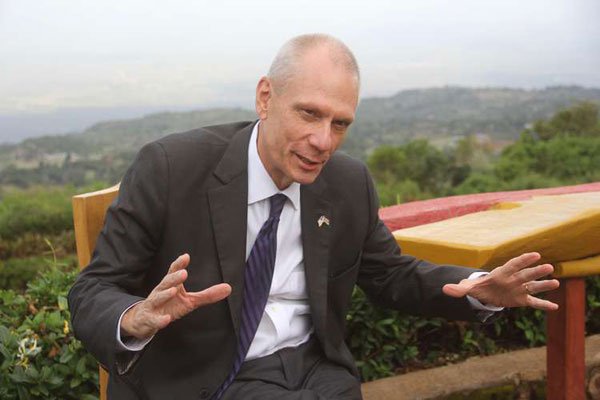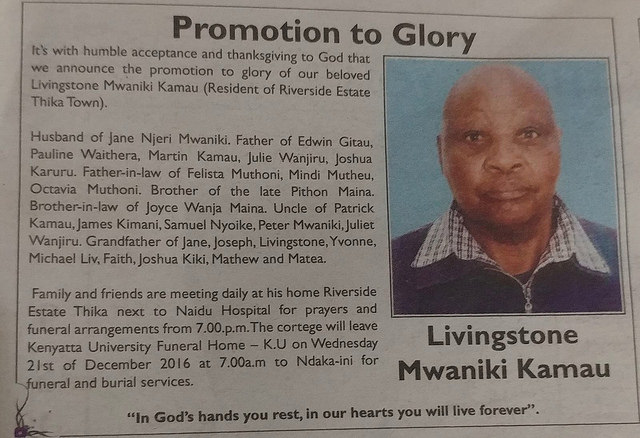Share this
American Ambassador Robert Godec. He downplayed the anxiety in government circles and said his country was only interested in “Kenyan people to freely make their choices in an environment of transparency and peace”. PHOTO | FILE | NATION MEDIA GROUP
American letter on election cash that may have rattled Jubilee
President Uhuru Kenyatta’s statement on Jamhuri Day that foreign governments may be seeking to unduly influence the outcome of the next General Election could have been triggered by a United States government document that seeks to fund civil society before the 2017 polls.
The Kenya Electoral Assistance Programme 2017 by the United States Agency for International Development invited applications from non-governmental organisations in December 2016.
On Saturday, in response to Nation enquiries, US Ambassador to Kenya Robert F. Godec downplayed the anxiety in government circles and said his country was only interested in “Kenyan people to freely make their choices in an environment of transparency and peace”.
This comes as Interior Principal Secretary Karanja Kibicho warned NGOs that are not adhering to Kenyan law that they could be shut without notice.
The USAid working document, that has sent alarm bells in government, calls for interested NGOs to apply in four key categories aimed at “improving ability to hold a free, fair, credible and peaceful election”.
USAid has set aside Sh2 billion to achieve the goals of the four components. The first component is “key institutions voter registration, voter education and election coordination”. The second has “women and youth participation and inclusion” while the third component has “domestic and international observation”. The fourth includes “dialogue, consensus building, conflict and early warning/early response”.
It is the details in the document that appear to have made some people in government raise questions, prompting President Kenyatta’s warning.
PROMOTE INTEGRITY
In the first category, one of the results that prospective civil society groups are supposed to achieve is “enhanced use of ICT to promote integrity of the electoral process though establishment of an efficient results management system and creation of accurate voters register”.
This was interpreted as formation of a parallel tallying centre by government mandarins.
The second component also calls on applicants to ensure that more women and youth are elected to parliament in the forthcoming General Election.
In the same document, there is what is dubbed “cross cutting themes” where anti-corruption efforts are listed. The document says that corruption is not a focus of the programme, but it will seek to spread the anti-corruption themes.
In addition to the United States, the Jubilee administration is watching four other Western countries that are pumping in millions of shillings to ensure free and fair elections.
A secret memo from the NGOs Coordination Board to National Intelligence Service Director-General Philip Kameru also lists the European Union, United Nations Development Programme and agencies of Norway, Denmark and Finland as having given close to Sh16 billion.
The memo warns that these organisations are funding local groups to influence the next General Election under the guise of supporting charity and pro-democracy efforts.
The memo by the board’s executive director, Mr Fazul Mahamed, dated November 7, cites funding from the European Union (Sh3.1 billion), USAid (Sh2 billion), the UK’s Department for International Development (Sh2.6 billion), and the Norwegian aid agency (Sh530 million). Others are the Danish International Development Agency (Sh2.1 billion) and the Finnish Government (Sh875 million).
Many of the foreign donors prefer channelling the funds through UNDP, which then works with NGOs picked to run various programmes.
RAISED EYEBROWS
But the President’s statement has also raised eyebrows since some NGOs perceived to be targeted by the renewed hostility include those critical of the Jubilee administration or were involved in the International Criminal Court cases following the 2007/2008 post-election violence.
The cases against President Kenyatta, his Deputy William Ruto and radio journalist Joshua Sang were terminated at the Hague-based court.
The NGOs include the Africa Centre for Open Governance (Africog), the local chapter of the International Commission of Jurists, Kituo Cha Sheria and Kenya Human Rights Commission.
Africog, headed by Ms Gladwell Otieno, was a party in the Supreme Court presidential petition challenging the election of Mr Kenyatta in 2013. It was also among the NGOs that worked with the ICC on the Kenyan cases.
The Kenya Human Rights Commission, chaired by Prof Makau Mutua, a fierce government critic, is also a key beneficiary of the funding.
In his Jamhuri Day speech on Monday, the President did not mince his words, drawing comparisons to claims of “foreign interference” in the November US presidential elections.
“There is already money coming into Kenya from abroad in the guise of supporting good governance or civic education. However, its true intention is to influence our electoral choices … I want to caution those members of the international community taking these actions that the Kenyan people do not look kindly on such actions … This is our country, and no one should ever try to control our choices for their selfish interests,” he said, urging Kenyans to reject such attempts.
Dr Kibicho, the Interior PS under whose docket the NGO Coordination Board was recently placed, says the government expects to be informed on all activities NGOs are undertaking.
“Everywhere in the world, if you go to a foreign nation you must declare the money you have. If you do not declare it, it is called money laundering. We know there are people who would want to expand civic education on a number of issues; no problem with that, they are welcome. But there are those institutions that are supposed to do so — work with them,” he said.
SECURITY ISSUES
He said the NGOs should not get involved in security issues.
Alluding to KEAP 2017, the PS said only IEBC is mandated to register voters.
“There are those mobilising people to register as voters. How far more interfering can one be? Even if they have a trillion shillings, they won’t register people — that’s the work of IEBC,” he said.
The PS appeared miffed that US was encouraging the election of more women and youth, saying that would amount to circumventing democracy.
“How can you come and pump money to have youth and women elected? What you need is to educate the youth on the importance of participating in governance. And this must be through known institutions like the ministry in charge of youth affairs,” he said.
Ironically, on Tuesday, top Jubilee politicians, including Majority Leader in the National Assembly Aden Duale, attended an event to launch a database of 5,000 women aspirants seeking elective positions next year that is largely supported by the US government.
Dr Kibicho said the government is reviewing all NGOs to ensure they have complied with the Kenyan law.
“We have many donors who have not complied with basic expectations. You just can’t say you have an account at (a bank in) Riverside (Nairobi) only for us to discover you have another secret account in River Road with Deutsche Marks. There must be transparency, failing which we will act,” he said.
But Ambassador Godec read mischief in the latest statements on election-related funding. He said the government is fully aware of what the US is doing since it is a joint project.
“We operate with full transparency. For example, our solicitation for proposals for electoral programming was a publicly-available document. We created the Kenya Electoral Assistance Programme in consultation with leaders in government, political parties and civil society, who identified weaknesses in the 2013 electoral process that would benefit from US support,” he said.
The ambassador said the programme is aimed at helping IEBC identify the best systems to promote efficient and accurate transmission of results. Mr Godec said the United States has no favoured aspirants but is instead helping women and youth to develop the skills required to run for nominations from any party of their choice and at all levels.
INFLUENCE ELECTION
“We do not use this help to influence the election for any side, political party or candidate. Rather, our assistance supports the Kenyan people to independently exercise their right to vote and have their voice heard. The Kenyan people alone have the sovereign right to choose their leaders and we fully respect this right. In all our programmes, we emphasise on anti-corruption, participation, and equity,” he said.
Human rights lawyer Haron Ndubi accused the government of blowing things out of proportion, arguing that IEBC cannot do everything, including voter education. He also accused Jubilee of double standards since the party’s officials were recently trained by China’s Communist Party.
He said State House Presidential Strategic Communications Unit director Dennis Itumbi has continued to call civil society “evil society”, a pointer that he has the President’s approval.
“The President is obsessed with NGOs in human rights and governance sectors because he has not forgiven them for their perceived role in his ICC case. He needs to forget and move on instead of being stuck there like a record,” he said.
He said State House Presidential Strategic Communications Unit director Dennis Itumbi has continued to call civil society “evil society”, a pointer that he has the president’s approval, “when what we are doing is good for the country”.
“Is it not interesting that all reports by these groups of civil society, best referred to as Evil Society, were rejected as hearsay by the ICC judges and completely rubbished as rumours by South African judge Johanna Kriegler of the Kriegler Commission?” asked Mr Itumbi.
Source:Daily Nation





















